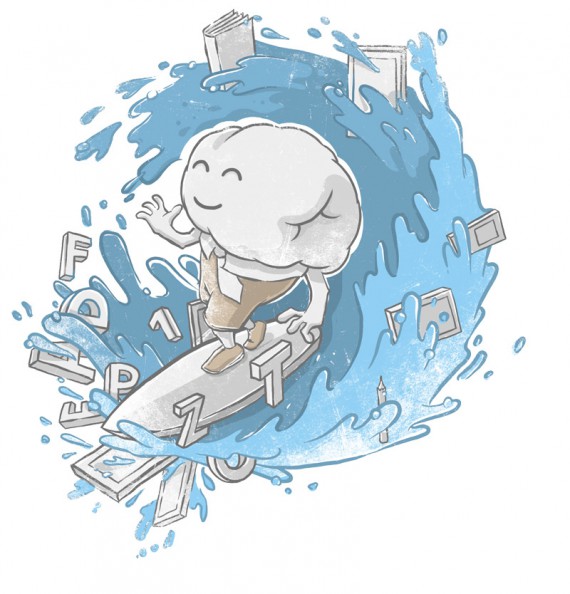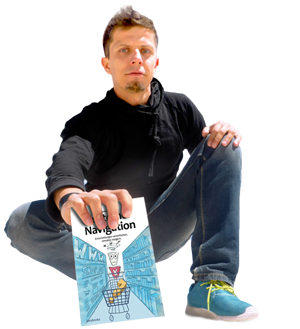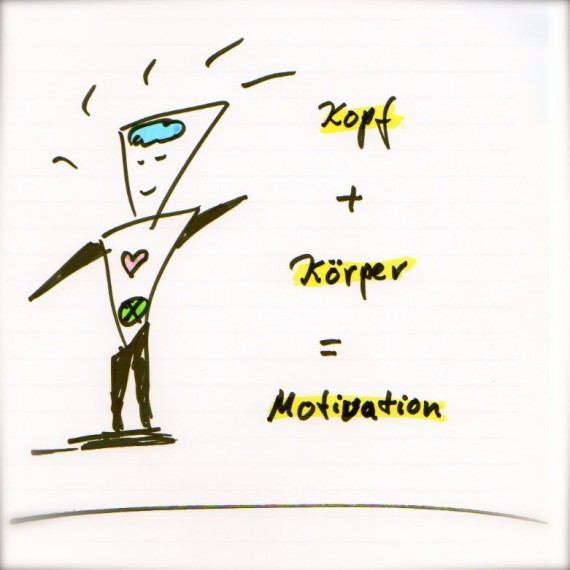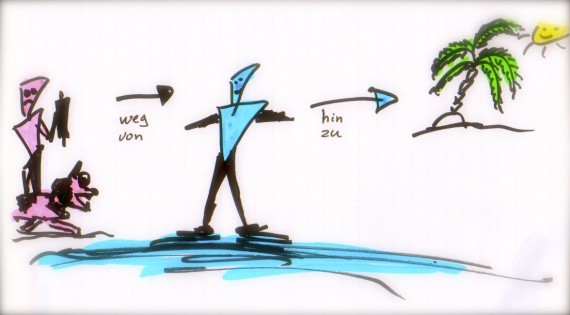Bestsellerautor & Strukturgeber
What is motivation?
 Motivation: What is this actually? If you somehow are asking yourself this question once in a while, you probably suffer from a lack of motivation or even demotivation.
Motivation: What is this actually? If you somehow are asking yourself this question once in a while, you probably suffer from a lack of motivation or even demotivation.
But when you know what motivation actually means, you can deduct concrete factors of motivation and tips.
What is motivation? First approach
1. Motivation = Head + body
When I first started my studies, we were supposed to fill out a brochure to present ourselves to companies. One question was: „Why do you get up in the morning?“ – My motivated, (over-)ambitious fellow students answered: „Because I want to change the world“, „I wanna move something“, „I want to make use of the day“. Of course I didn’t know what the others were writing and I thought about my answer very seriously. Eventually I totally sincerely answered: „Because my empty stomach tells me to.“
This leads us to Maslows hierarchy of needs.
What is motivation? Let’s ask Maslows Hierarchy of needs

Maslow’s hierarchy of needs, represented as a pyramid with the more basic needs at the bottom, Source: FireflySixtySeven @ Wikipedia
Motivation comes from a bunch of psychological and physical needs. Maslow’s famous pyramid of needs of motivation factors may be a little outdated, but it visualizes very well the different layers and facets of motivation: starting from basic needs like hunger, sleep, sexuality over social needs like social affiliation, appreciation and status to individual fulfilment – those are pretty diverse motivation or demotivation factors. I’d like to simplify those to two components. There is one…
- mental factor of motivation (determined by my thoughts, goals and sorrows) and a
- physical-energetic factor of motivation (triggered through deficits like hunger, thirst, sexual desire, fear or „positive“ energy like motion impulse, the need of fresh air, light and sun).
If the basic needs like sleep, good nutrition and social contacts are not met, the body will rebel and try to get back what it needs. Head and body have to play on the same team and both be considered – and motivated! Therefore it’s pretty senseless when a motivational coach tells you: „Invest more energy to reach your goals.“ If there is no energy, the best will won’t help you. I’m sorry!
Let’s pin this down: Head and body have to come together. Whoever squeezes his body like a lemon shouldn’t wonder when he soon has no juice left!
Let’s pin this: Head and body have to come together. Who squeezes his body like a lemon shouldn’t wonder when he soon has no juice left!
Higher, faster, wider, better, more efficiently – this just goes as long as the battery can keep up with you. In the „Golden Rules“ I developed a model called „life batteries„, which shows how you can keep your batteries fully charged like a Duracell – and not like a three-years old iPhone battery.
Back to topic: What is motivation?
First answer is: Motivation is juggling.
We have to harmonize the different areas in life and claims of head and body. Only he who relaxes can stretch. It’s like in sports: no regeneration, no top performance!
Intrinsic and extrinic motviation:
2. The two stimuli systems from motivation psychology
The motivation theory as well as management literature and motivation trainers distinguish between two sources of motivation:
- Intrinsic motivation: If motivation comes from the inside and could also result without external stilmuli.
- Extrinsic motivation: If the motivation comes from the outside.
Typical examples for intrinsic motivation are hobbies, parties, art, music – anything you like to do and what comes easy to you. Examples for extrinsic motivation are salary and money in general, status and other stimuli systems (company car, job title, bonuses…).
The problem with intrinsic motivation is that there are too few jobs in the cool occupations. The problem with extrinsic motivation is that it ebbs as soon as the stimuli fade away. There are even studies which prove that extrinsic motivation through more money can let the former intrinsic motivation run dry. The discussion is old and old fashioned. Hence I refer to Wikipedia. There are other exciting approaches!
Well: What else is motivation?
3. The two directions of motivation
„Movere“ is Latin and means „moving towards something“ (e.g. an aim) or „away from something“ (e.g. an avoidable condition). Without breaking down all the scientific studies I want to mention that research – and also training and coaching practice – comes to two simplified directions of motivation:
- Run-away-motivation: We want to escape from an undesirable status, e.g. avoid an argument with colleagues, boss or partner, bad grades or feedback, escape from vicious dogs.
- Run-to-motivation: „Aruba, Jamaica, ooo I wanna take ya – Bermuda, Bahama, come on pretty Mama…“ Have you ever noticed how full the streets get in winter and spring when some sunrays appear? That’s totally typical for a run-to motivation: sun is energy, warmth, feeling of security. That’s where we want to go. It’s like we want to get to sexy partners, into the refreshing bath, into vacation.
Interestingly the „run-away motivation“ often is very highly intense, some people would do everything to „escape“ (from pain, feeling unwell when someone focuses on our ugly parts, sadness, aimlessness, insecurity). I see the „run-to motivation“ very close to the intrinsic motivation, because both states seek for a desired status.
Conclusion: What is motivation?
When I look at all the theories, facts and examples of motivation again and then would try to answer the question, „What is motivation“ in one word, I’d say:
Motivation is Energy.
Motivation gives us energy and it needs energy. It moves us to act, because our body has physical or emotional needs or because our head moves toward a special aim or away from an awkward objective.
Sources and literature on the question of what motivation is:
- Kroeber-Riel/Weinberg (2009): „Konsumentenverhalten“, Vahlen, 9. Auflage.
- Deci/Ryan (1985). Intrinsic motivation and selfdetermination in human behavior. New York: Plenum Press.
These were some of my thoughts on my definition of motivation. What is your viewpoint?
Kategorie: Allgemein
Artikel von Martin Krengel
am 02.04.2015
#1 Bestseller Zeitmanagement
Der unkonventionelle Ratgeber bringt die 50 wichtigsten Selbstmanagement-Regeln auf frisch-freche Art auf den Punkt. Lerne alles, was du über Motivation, Prioritäten, Fokus und Tagesplanung ...
Dein Ziel ist im Weg: Ein ehrlicher Motivations-Booster
Oft haben wir völlig verdrehte Vorstellungen davon, wie wir das erreichen können. Wir stehen uns mit unseren Gedanken, Erwartungen und hohen Ziele selbst im Weg. Das Buch zeigt, wie Motivati...
Customer Navigation: Einfach verkaufen, Umsatz steigern
Konsumentenpsychologe Dr. Martin Krengel zeigt, wie Sie Sortimente und Angebote verständlich, ansprechend und kundennah gestalten und präsentieren. Sie erfahren, wie Sie Online-Shops, Produk...







